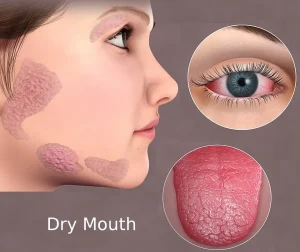Overview
Dry mouth, medically known as xerostomia, is a condition in which the mouth does not produce enough saliva to keep tissues moist and healthy. Saliva plays an important role in digestion, speech, and oral health. Reduced saliva production can lead to discomfort and increase the risk of dental and oral problems. Dry mouth may be temporary or chronic, depending on the underlying cause.
Symptoms
Symptoms of dry mouth can range from mild to severe:
-
Sticky or dry feeling in the mouth
-
Thick or stringy saliva
-
Frequent thirst
-
Difficulty chewing, swallowing, or speaking
-
Dry or sore throat
-
Cracked lips or corners of the mouth
-
Bad breath
-
Altered sense of taste
-
Burning sensation in the mouth
Causes
Dry mouth occurs when salivary glands do not function properly:
-
Side effects of medications such as antihistamines or antidepressants
-
Dehydration
-
Aging-related changes in salivary gland function
-
Autoimmune disorders affecting salivary glands
-
Radiation therapy to the head or neck
-
Nerve damage
-
Mouth breathing
Risk Factors
Certain factors increase the likelihood of experiencing dry mouth:
-
Older age
-
Use of multiple medications
-
Chronic medical conditions
-
Smoking or tobacco use
-
Alcohol consumption
-
Cancer treatments involving the head and neck
-
Poor hydration habits
Complications
If left unmanaged, dry mouth may lead to oral health issues:
-
Tooth decay
-
Gum disease
-
Oral infections such as candidiasis
-
Difficulty wearing dentures
-
Problems with speech and eating
-
Decreased quality of life
Prevention
Preventive measures focus on maintaining saliva flow and oral health:
-
Drinking water regularly
-
Avoiding tobacco and alcohol
-
Using sugar-free gum or lozenges to stimulate saliva
-
Maintaining good oral hygiene
-
Managing underlying medical conditions
-
Reviewing medications with a healthcare provider
-
Using a humidifier, especially during sleep
Advertisement

